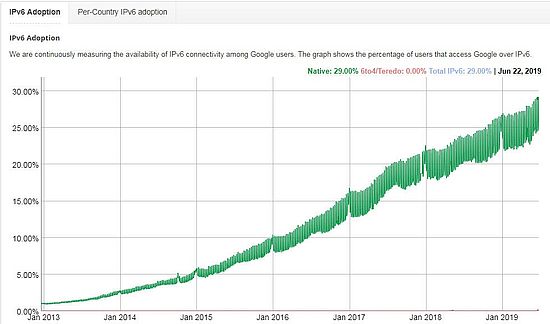
IT Services introduces version 6 of the Internet Protocol at the University of Basel (02.07.2019)IPv6 at the University of Basel
Every device that is connected to the Internet needs a unique IP address so that it can be found. This can be compared to specifying the town, street and house number in postal traffic.
Since the invention of the Internet, version 4 of the Internet Protocol (IPv4) has been used until recently for this address assignment and for transporting data in company networks and on the Internet. In the 1990s, however, the development of version 6 of the Internet Protocol (IPv6) already started, as it was already anticipated at that time that the limited address space of IPv4 would not be able to withstand the rapid growth of the Internet. In particular, new technologies such as the Internet of Things (IoT) and sensor-based monitoring and control systems have a high demand for IP addresses that can no longer be met with IPv4 since 2011. New devices must therefore be connected via IPv6 and certain manufacturers are pushing this in their products: For example, Microsoft Exchange or the Apple AppStore, where it is only possible to offer applications that can run in a pure IPv6 environment.
In addition to other universities, the University of Basel is also interested in a smooth transition and is currently in a long-term process with the gradual introduction of IPv6.

This graph shows how the use of IPv6 has increased in recent years (figures as of 22 June 2019, source https://www.google.com/intl/en/ipv6/statistics).
According to the website www.worldipv6launch.org, of the most visited websites internationally according to the Top Alexa 1000, around 25% are already accessible via IPv6.
A normal Internet or network user does not come into direct contact with the IP address and thus also with IPv6, because controlling the addressing of the individual devices in a network is normally the task of the Internet Service Provider (ISP) or the network administration. At the University of Basel, therefore, it is mainly those people who are more closely involved with information technology who come into contact with IP addresses. In concrete terms, these are the IT services and computer managers - sooner or later, however, also researchers. There are various reasons why version 6 of the Internet Protocol is becoming increasingly important. For example, advancing digitalization and trends towards the Internet of Things or Industry 4.0 are leading to more and more devices being connected to the Internet. Not only networks, but also everyday objects are becoming more complex and require a continuously growing number of IP addresses. For example, a car will soon need well over a hundred of them in the near future. Only by switching from IPv4 to IPv6 can this flood of address needs be accommodated, and IT Services at the University of Basel is ensuring an early, gradual changeover. As a rule, the introduction of a new Internet protocol in a larger network takes several years and has an impact, for example, on IT equipment to be purchased. It is by far not enough to just change over the network: Applications often have to be adapted so that they can be used in an IPv6 network.
The IT Services of the University of Basel have already been working on the implementation since 2016 and, in addition to a differentiated programme structure, have not only constituted an IPv6 Transition Office (ITO), but are also working with adapted procurement guidelines, revised guidelines and offer internal training and workshops for employees. In the meantime, Internet access via IPv6 has also been activated and the first IPv6 addresses are being incorporated into the newly designed address concept. Together with our Cisco partner, an IPv6 readiness profile of the infrastructure devices was created andVPN outside for remote access already supports the new Internet protocol. In addition, experience is being gathered in the lab set up especially for the changeover. The introduction of IPv6 at the University of Basel must be understood as a successive program and will take place gradually over several years. Ultimately, all aspects are affected: From security mechanisms to all applications, services and devices connected to the network. In different areas, the requirements and challenges are sometimes very different, but this issue can be well addressed with a program structure that is planned for the long term. The introduction of IPv6 is inevitable and essential in the long term, which is why many institutions around the world have been working on this changeover for several years. Some examples are BMW, LinkedIn, Cisco, Microsoft, Swisscom, the Swiss Post, Postfinance, SBB, Facebook and many more. In addition to the University of Basel, other universities are also working on the conversion to IPv6, such as the ETH, EPFL, University of Bern, University of Fribourg, CERN and abroad, e.g. Oxford University, University of Pittsburg and the University of New Hampshire.
Early migration from IPv4 to IPv6 has several advantages. Even when accessing an international website today, access via IPv6 is often faster than via IPv4, and the internet service providers have ensured that the worldwide internet supports version 6 of the internet protocol across the board. In Switzerland, around 30% of Internet users are currently already using IPv6, a figure which is in line with the global average. A timely introduction opens up the possibility of planning one's own course of action in peace and prevents the University of Basel from being forced to make a hasty changeover at a later date. In addition, devices and applications can be progressively replaced to be IPv6-capable, which additionally spreads the costs in the case of a long-term changeover. The question is not if, but when the University of Basel will follow suit, because IPv6-only products and solutions will be coming in the near future, vendor support will be discontinued with IPv6 turned off, and IPv6 is a security risk in an unprepared, unmanaged environment. Nevertheless, the guiding principle is "keep calm", because with good and forward-looking planning, users will hardly notice anything about the changeover.
Links & Downloads
Contact
(Kopie 12)
Quick Links
